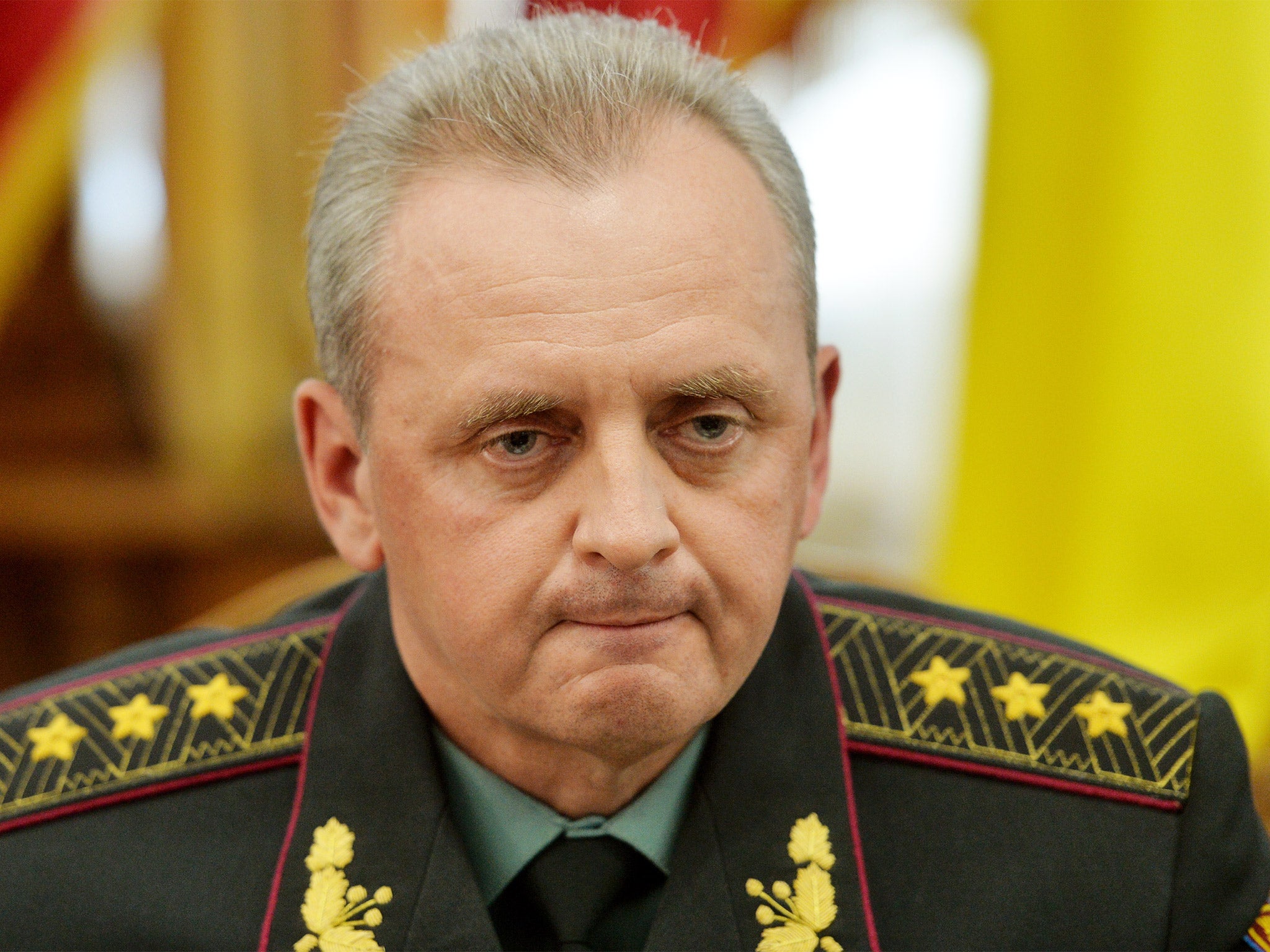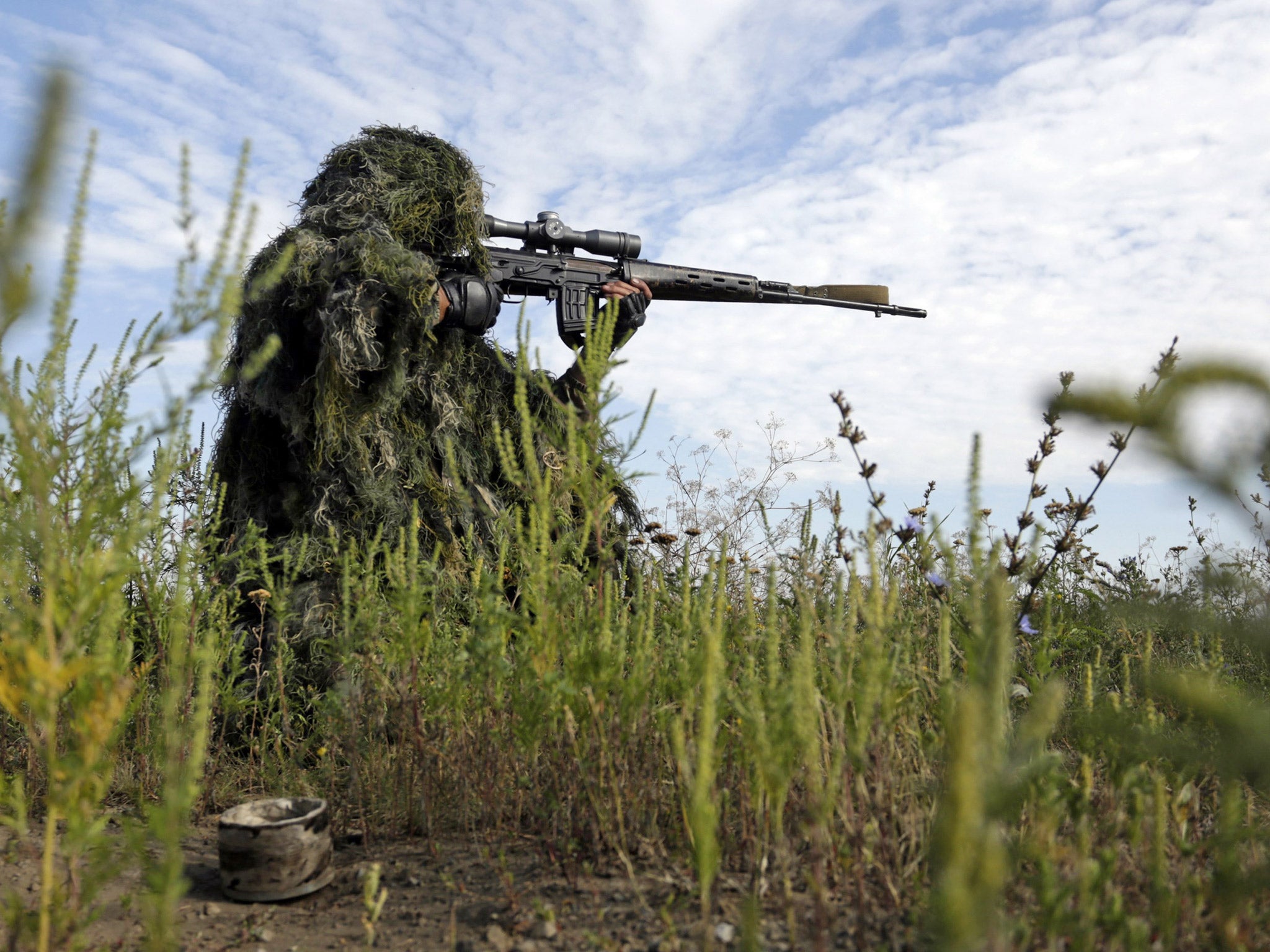Ukraine crisis: Ukrainian commander-in-chief lifts the lid on the conflicts fragile ceasefire
Colonel-General Viktor Muzhenko tells Oliver Carroll about Russian mobilisation and manoeuvres in the separatist enclaves – and wonders how long it will be before shots are fired in anger once more

Your support helps us to tell the story
From reproductive rights to climate change to Big Tech, The Independent is on the ground when the story is developing. Whether it's investigating the financials of Elon Musk's pro-Trump PAC or producing our latest documentary, 'The A Word', which shines a light on the American women fighting for reproductive rights, we know how important it is to parse out the facts from the messaging.
At such a critical moment in US history, we need reporters on the ground. Your donation allows us to keep sending journalists to speak to both sides of the story.
The Independent is trusted by Americans across the entire political spectrum. And unlike many other quality news outlets, we choose not to lock Americans out of our reporting and analysis with paywalls. We believe quality journalism should be available to everyone, paid for by those who can afford it.
Your support makes all the difference.A trip to the General Staff building in Kiev, the engine room of the Ukrainian war effort, is a journey back in time. Once inside the crumbling compound, and past several guard stops, you’re greeted with wide, brown Stalinist corridors, and walls decorated with Soviet-style military pomp. There is little attempt to hide the country’s deep, common history with its eastern neighbour, and now adversary.
Like many of Ukraine’s top military officers, commander-in-chief Colonel-General Viktor Muzhenko has a long association with Russia. He spent his formative years as a young cadet in Leningrad, the present-day St Petersburg; many friends and family remain on that side of the border. Yet the past 15 bloody, fraught months at the helm of the Ukrainian armed forces have left him altogether apprehensive about the intentions of once fellow compatriots. Ukraine’s top commander says he holds little hope that key conditions of the Western-brokered Minsk peace accord – aimed at stopping the conflict between government forces and the Russian-backed separatists – will be fulfilled.
“I don’t believe Russians will withdraw their troops, hand over control of the border, or allow free elections in Donbass, no, absolutely not,” he said. “I can only assess what is happening at the moment and there is currently little evidence of movement on any of these fronts.”
Col-Gen Muzhenko confirmed that while a ceasefire has largely held since 29 August, reconnaissance groups have remained active along the front lines. A significant enemy military presence – “more than 40,000” – remains inside the separatist enclaves, he said, and “all of them are answerable to a Russian chain of command”.
This month, 95,000 troops took part in extraordinary exercises in Russia, he said. The commander interprets these as a direct threat to Ukraine. “Where else can they be headed? I very much doubt Russia could put such a force together for Syria.”
Last year, at a time when Ukraine was much less prepared militarily, Russian tanks were described as being just “a few hours” away from Kiev. Today, the threat of a full-scale invasion seems diminished, but Col-Gen Muzhenko says Ukraine has not ruled it out due to the “volatile” nature of the situation.
“We have plans for every possible scenario – from defence to offence… we have to be ready to react,” he said.
In his time as Commander-in-Chief, Col-Gen Muzhenko’s own actions have attracted much criticism from public and military alike. They point to his role in the damaging capitulation at Ilovaisk in August 2014, then the loss of Donetsk airport in January 2015, and the equally humiliating retreat from Debaltseve in February. Many believe army incompetence and hubris cost many Ukrainian lives. Some estimate the number of soldiers lost in the Ilovaisk battle alone to be more than 1,000 (official figures are nearer 500). Col-Gen Muzhenko told The Independent that about 90 per cent of the information he received during the Ilovaisk battle turned out to be false.
It was, he says, a failure of Ukrainian intelligence gathering and deliberate Russian misinformation.
“The Ukrainian army was deliberately destroyed over the past decade – systematically,” he said, referring to what he called the presence of foreign agents undermining the military. Intelligence had improved significantly since then, he claimed, but the reality of Russian infiltration “remains an issue”. Summer 2014 represented a chaotic low point for the Ukrainians, and was the “worst moment in the war” for the commander himself.
“We had entire units to the south of Donetsk in Ambrosievka and Uspenka abandoning their positions without orders,” he said.
Some of the soldiers were “defeated psychologically”, and were “lacking proper military preparation”.

In reality, an unanticipated surge had meant that many soldiers felt outgunned. Some of those who left say they had run out of ammunition.
Russia denies involvement in these crucial battles, but credible evidence appears to suggest otherwise. Around the time of the surge, 10 Russian paratroopers were captured inside Ukrainian territory; they claimed to have “got lost”. Over in Luhansk, Ukrainians captured documents and two armoured vehicles from what they say was Russia’s Pskov 76th Airborne division. An independent Russian newspaper corroborated this version, reporting major casualties in that division, and drawing on interviews with bereaved wives.
Col-Gen Muzhenko said regular Russian forces had a tactic of operating in the second wave of attack, to reduce visibility. He also made new claims about a previously undisclosed role of Russian special forces in the battle for Debaltseve in February. He said the appearance of such units within the town itself was the factor that forced the Ukrainians to retreat.
"I can’t have your readers thinking the Ukrainian commander-in-chief has Napoleonic tendencies"
“We were holding Debaltseve right up until Russian special forces and marines entered the town – we had a supply route, had ammunition, but that was a game-changer and we had to leave,” he said. The forced retreat from Debaltseve happened after the signing of the Minsk agreement, at a time when a ceasefire was supposed to be in place. Col-Gen Muzhenko rejects criticism that the retreat from Debaltseve was “panicked”. Instead, he says military planners could not order the withdrawal as quickly as they had liked since they were waiting for enemy artillery to be repositioned from the east, from where it could easily hit Ukrainian escape routes. As soon as that happened, Ukrainian forces began to withdraw. “The retreat was planned, co-ordinated and staged, and with minimal losses,” he said.
Given the level of hostility that now exists between the two countries, once part of the same state, did Col-Gen Muzhenko ever envisage returning to Russia?
“If this wasn’t an interview, I’d tell you exactly how I’d like to return,” he says.
“But please understand me right – that was a joke.
“I can’t have your readers thinking the Ukrainian commander-in-chief has Napoleonic tendencies.”
Ukrainian pilot: 'I was taken by separatists’
Hauled before a Russian judge on charges of killing two journalists, a Ukrainian politician has demanded that she be released, saying she had been kidnapped by separatists and held hostage.
Nadezhda Savchenko, 34, faced a court in the Russian town of Donetsk accused of complicity in the deaths of the Russian journalists in Ukraine in June last year, before illegally crossing into Russia. She asserts she had been captured in Luhansk, handed over to Russian forces and held for a week before being charged.
Ms Savchenko, who is a former military pilot and now a Ukrainian MP, faces up to 25 years in prison if found guilty.
Meanwhile in Kiev, a court extended the detention of Russian servicemen Alexander Alexandrov and Yevgeny Yerofeyev, who were captured in eastern Ukraine in May, for at least two more months. Russia’s defence ministry said they had resigned from active duty in December.
Reuters
Join our commenting forum
Join thought-provoking conversations, follow other Independent readers and see their replies
Comments